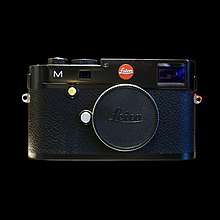Leica M (camera)
 | |
| Overview | |
|---|---|
| Type | Digital rangefinder camera |
| Lens | |
| Lens | Leica M-mount, Leica R-mount (with R-Adapter M) |
| Sensor/Medium | |
| Sensor | Leica MAX 24MP CMOS Sensor, designed by CMOSIS |
| Image sensor maker | STMicroelectronics |
| Maximum resolution | 24 Megapixels |
| ASA/ISO range | 200 to 6,400. Pull 100 available, Auto ISO |
| Storage | SD up to 2GB and SDHC up to 32GB |
| Focusing | |
| Focus modes | Manual |
| Exposure/Metering | |
| Exposure modes | Manual, aperture priority auto exposure |
| Exposure metering | TTL, center weighted averaging |
| Flash | |
| Flash | Fixed hot shoe |
| Shutter | |
| Shutter | Focal plane, metal curtains, vertical travel |
| Shutter speed range | 60s to 1/4000s |
| Viewfinder | |
| Viewfinder | Rangefinder and additional color LCD display: 3", 920,000 pixels. Live View |
| General | |
| Video/movie recording |
1080p, 720p, 640*480 (VGA) 25 fps, 24 fps, 30 fps (VGA only) |
| Battery | Lithium ion, 7.4V, 1,800 mAh |
| Dimensions | 139 mm × 80 mm × 42 mm (5.5 in × 3.1 in × 1.7 in) |
| Weight | 680 g (24 oz) |
The Leica M (Typ 240) is a full-frame mirrorless interchangeable-lens camera in Leica Camera AG's rangefinder M series. It was introduced in September 2012, and is the successor to the Leica M9 range of cameras. The M uses a 24-megapixel image sensor. The camera is the first M model to feature movie recording,[2] and the first to have Live View, which allows the scene, as viewed through the lens, to be composed.[3] The M can use most M- and R-mount lenses. Leica M cameras are made by hand in Portugal and Germany. There is also a version, the M Monochrom, with a monochrome, rather than colour, sensor.[4]
The M Typ 240 has been superseded by variants such as the Leica M (Typ 262).
Features
The M uses a CMOS 24-megapixel (6,000 × 4,000 pixels) image sensor designed for Leica by the Belgian company CMOSIS,[5] and made by STMicroelectronics in Grenoble.[5] The pixels are on a 6 x 6 µm² grid.
The M supports most M-mount lenses and, with an adapter, almost all R-mount lenses.[3] R-lenses support an optional electronic viewfinder.[3]
The camera uses a MAESTRO image/video processor[1] which is based on the Fujitsu Milbeaut.[6] It is sealed against dust and water spray.[3]
Release
The Leica M camera was introduced at the photokina event in Cologne, Germany on 17 September 2012.[7] The launch event included a "concert by recording artist—and Leica shooter—Seal".[7]
References
| Wikimedia Commons has media related to Leica M Typ 240. |
- 1 2 "Leica M Technical data" (PDF). leica Camera. September 2012. Archived from the original (PDF) on 21 September 2012. Retrieved 18 September 2012.
- ↑ "The new Leica M as a filmmaker's tool – an interview with Leica's Jesko von Oeynhausen". www.eoshd.com. 24 September 2012. Retrieved 21 November 2012.
- 1 2 3 4 "Leica M – M as in milestone". Leica Camera. September 2012. Archived from the original on 18 September 2012. Retrieved 18 September 2012.
- ↑ Leica M Monochrom Review
- 1 2 "New Leica M Uses CMOSIS 24-MP CMOS Image Sensor". Antwerp, Belgium: cmosis.com. 17 September 2012. Retrieved 27 September 2012.
- ↑ "Fujitsu Microelectronics and Leica Camera Co-develop Image Processing System Solution for High-end Digital SLR Cameras". Fujitsu. 26 September 2008. Retrieved 27 December 2012.
- 1 2 Fisher, Jim (18 September 2012). "Leica Unleashes New M, S Cameras". PCMag.com. Ziff Davis Publishing Holdings Inc. Retrieved 19 September 2012.